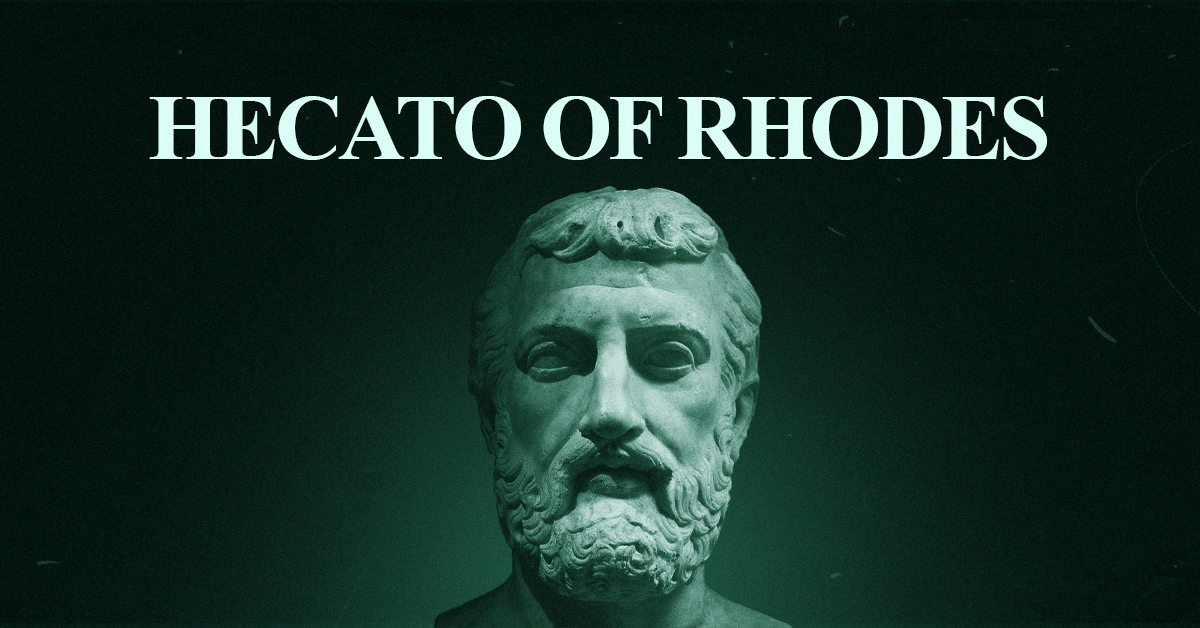
When you think of Stoic philosophers, you likely think of figures like Marcus Aurelius, Epictetus, Seneca, and Zeno of Citium. In this article, though, we will explore a handful of Hecato quotes, who was a prominent philosopher during his own time that has since been forgotten by history.
Though only a few fragments of writings exist from Hecato in the present day, we still can get a glimpse of what this Stoic philosopher believed.
What do we know about Hecato’s life? Other than the fact that he was a student of Panaetius and a native of Rhodes, pretty much nothing. While most of his books have been lost to time, we do know that Hecato was frequently cited by the likes of Seneca, Cicero, and Diogenes Laertius.
So without further ado, let’s take a look at some of the best quotes from the Stoic philosopher and consider how we can apply them to our modern lives.
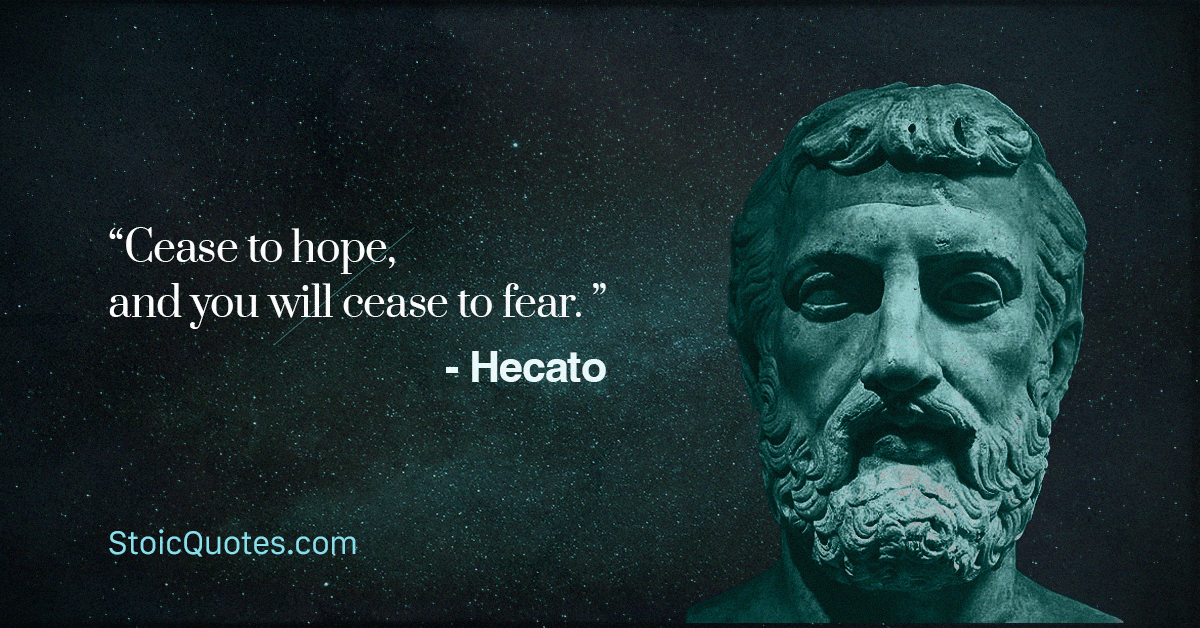
When we have the opportunity to read some of the few words of Hecato that have survived the millennia since they were written, it’s hard to not feel a bit sad that we have lost the bulk of his work. However, at the same time, we can be grateful to the likes of Seneca and Cicero for referencing Hecato, at least allowing us a glimpse into the mind of this forgotten Stoic philosopher.
"Cease to hope, and you will cease to fear."
-Hecato
It is thanks to Seneca that we have a number of Hecato’s quotes, including this one. This quote is found in Seneca’s Epistulae morales ad Lucilium, which was a collection of 124 letters that the famous philosopher wrote towards the end of his life after having worked for Emperor Nero for more than a decade. These letters were addressed to Lucilius Junior, who is a figure that is only known to modern scholars through the writings of Seneca.
When referencing this quote in these moral letters, Seneca the Younger said that the “primary cause” of both hope and fear is “that instead of adapting ourselves to present circumstances we send out thoughts too far ahead.”
This helps to put this Hecato quote in a broader context. What at first seems like an injunction toward nihilism (abandon all your hope and concern for meaning and you won’t have to bear the burden of being afraid) is actually a good reminder of the dangers of getting too far ahead of yourself.
One of the reasons that modern Stoicism seems to have regained popularity is because it can truly help you remember to focus on the present moment. In this day and age, it’s all too easy to spend most of your mental energy putting all of your hopes and dreams on someday far in the future.
For example, the standard, acceptable path through life in our modern society is to work a job steadily for several decades, all the while saving up money that you can then use to enjoy your life in retirement. It’s not that having retirement savings is a bad thing, but that people can project all of their hopes onto the future rather than learning to appreciate and enjoy the current moment they have.
At the same time, projecting your hopes of being happy into the future can also leave you lying awake at night, all of a sudden hyper-aware of the risks of having your savings invested in the stock market or the potential for increased inflation that leaves your savings not as handsome as you initially assumed.
Along with the hope that’s projected into the future, comes fear. When you are putting all of your eggs in the basket of something that has yet to happen, the idea that those things also might not come to pass can’t be too far behind.
Since we don’t have much in the way of Hecato’s writings, we are left to speculate as to what he meant from the fragments we do have. In this case, though, we learn through Seneca’s writings that this is a fairly straightforward notion.
Basically, hope and fear are two sides of the same coin. It is difficult, at some level, to have one without the other being present, even if subconsciously. The coin that carries both hope and fear represents our attitude about future events in a way that takes our consciousness away from the time when we can actually impart change through our attitude, mindset, and actions: the present.
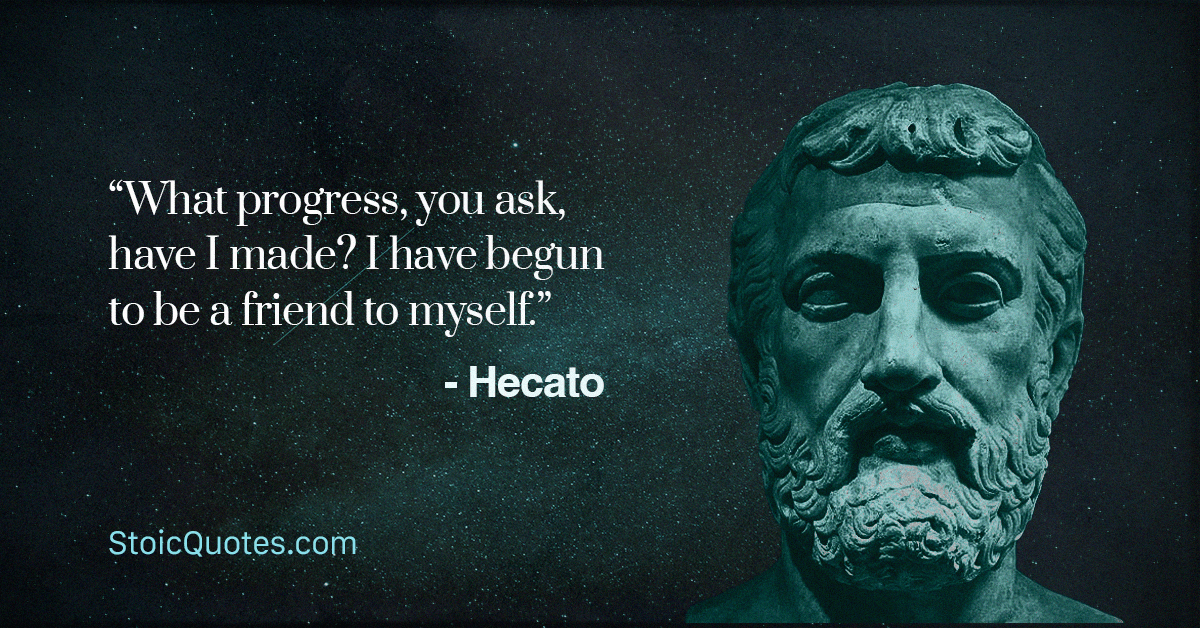
"What progress, you ask, have I made? I have begun to be a friend to myself."
-Hecato
We also have Seneca to thank for this quote from Hecato, as he references it in his Letters from a Stoic. In his writings, he stated that he was very pleased to come across this quote.
He goes on to say that a man such as one described in the quote “can never be alone. You may be sure that such a man is a friend to all mankind.”
This is an oddly sweet reminder of the importance of developing a genuine relationship with yourself. In our modern times, it’s all too easy to put all of your energy into your career, into pleasing those around you, and curating an image of yourself for others to consume online or otherwise. Even if you are doing all of these things with the highest moral intent, you are missing something very important when you don’t know, respect, and love yourself.
Reminiscent of the “you have to love yourself before you can love someone else” cliche, this is one of those ideas that is at once so obvious yet so hard to achieve. You can also find similar ideas echoed in a quote from Eleanor Roosevelt, where she stated that “friendship with oneself is all-important because without it one cannot be friends with anyone else in the world.”
Being a friend to yourself isn’t just about buying yourself nice things and “treating” yourself. It is, though, about recognizing that there is a tremendous depth within yourself that you can become familiar with, that you can contend with, and that you can learn to love and respect. Being a friend to yourself is ultimately more important than receiving the affirmation of others or being applauded in your career.
We live in strange times, ones where much of the social space has moved into the digital realm. We are constantly bombarded with the curated images of other people, and it’s only natural to feel some compulsion to put ourselves out there in search of affirmation. More and more, it can feel like a lack of presence on the internet equates to not really existing at all.
Relatedly, our culture seems to be moving in the direction of increasing normalization. People who are eccentric are less likely to be seen as interesting these days but rather viewed with skepticism. This can leave us all vying to prove just how aligned we are with the group, just how enlightened our opinions are within the current social/political/ethical quandary of the hour, and just how worthy we are of praise rather than banishment.
Of course, it’s natural to want to fit in. However, it’s important that we don’t do so at the expense of ourselves.
At the end of the day, all we have is the present moment and the environment we currently inhabit. While we do exist in a web of humans and all existence, we also have the strange experience of being quite alone within ourselves. Without cultivating a deep friendship and respect for yourself, it will ultimately be impossible to withstand hardships that are solely your burden to carry.
While it might be a lot to extrapolate from a brief quote, there is certainly some wisdom in this line of thinking. We have a tendency in our culture to blame all of the ills of the world on outside factors and not look too hard at ourselves. What if we did things the other way around?
It’s one thing to consider accepting yourself, but it’s another entirely to literally befriend yourself. What if you cultivated a relationship with yourself that was as rich (or richer) than any relationship you have with those you’re close with?
If you can achieve this, it makes you practically invincible. No matter what happens in your life, you always have yourself to turn to. In an unpredictable world, having the certainty of a developed friendship with yourself can mean the difference between meeting challenges head-on and melting at the slightest obstacle.
If you are displeased with the state of the world, consider befriending yourself first. According to Seneca, this is how you can be a friend to the world. From there, the love that you cultivate with yourself can be shared with others, which can impart improve the human condition and the world we live in.
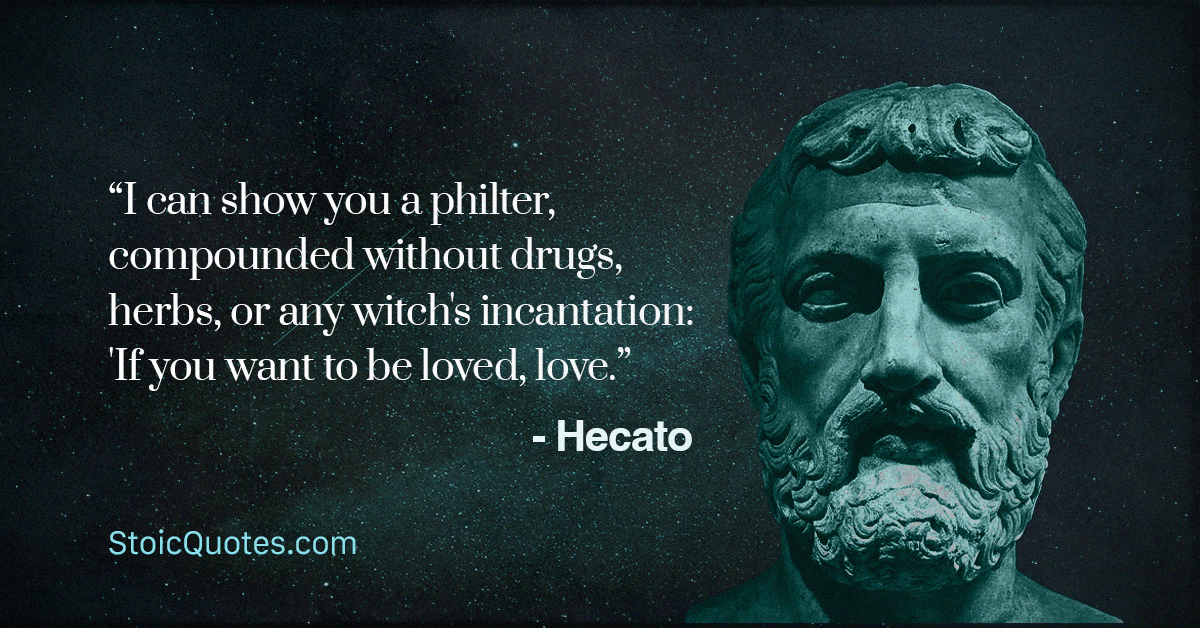
"I can show you a philter, compounded without drugs, herbs, or any witch's incantation: 'If you want to be loved, love.’"
-Hecato
One of the quotes you will most commonly find of Hecato’s is this short and sweet recipe for a potion. A philter, after all, is a brew that is intended to arouse desire and love from the person drinking it.
Here, Hecato claims to give you a love potion that doesn’t involve any witchcraft or digging through your herbal apothecary. He states that the way to receive love is to give love, and does seem to equate some magic to the whole equation.
Isn’t there something so strange about this truth? Love isn’t a currency that you should stockpile and hold on to for a rainy day. It is a force that inherently creates more of itself when you spend it.
You often hear Stoicism referred to as a philosophy that advocates for emotionlessness and keeping a stiff upper lip. Here, though, we find that Hecato is pointing towards an important and softer aspect of Stoicism. Love is an energy that we get back when we give, and if we desire to be loved by others, we must love them first.
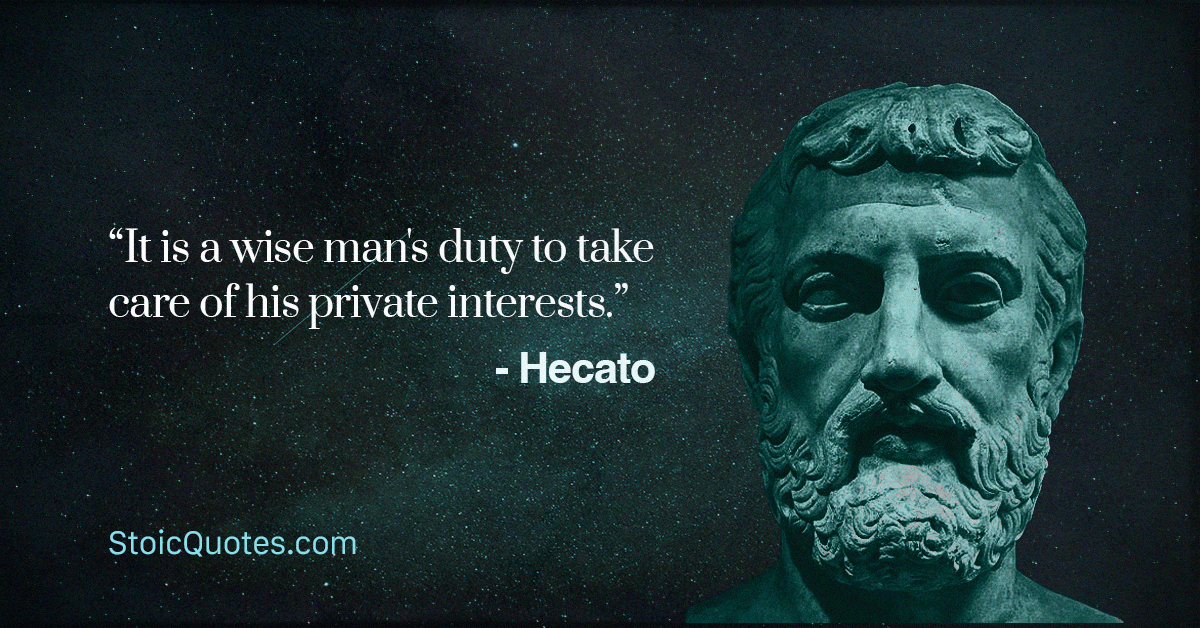
"It is a wise man's duty to take care of his private interests, at the same time doing nothing contrary to the civil customs, laws, and institutions. But that depends on our purpose in seeking prosperity; for we do not aim to be rich for ourselves alone but for our children, relatives, friends, and, above all, for our country. For the private fortunes of individuals are the wealth of the state."
-Hecato
It’s worth considering this quote in relation to the above quote where Hecato states that he has “begun to befriend” himself. As you can see, our Rhodian philosopher understands that taking one’s self-interest seriously isn’t just a question of “getting yours.” By focusing on your private interests, so long as you have the right intent, you are helping to support your family and your country at large.
Here he is pointing toward the reality that a nation is only as rich as its inhabitants. While it’s easy to think of countries as nonhuman entities, they are ultimately made up of a group of individuals. When we work to take care of our private interests, we are doing our part to help make our society as a whole successful and functional.
It is in this quote that we can see Hecato’s understanding of individuals existing in a web of relationships. Who we are and what we do can have a major impact on the people around us and the world we live in. However, in some strange way, the best way we can help to improve the lives of others is to improve ourselves, centered around the notion that virtue is the only good. Being virtuous, however, is not necessarily equated with poverty and asceticism– according to Hecato, acquiring wealth can be precisely the best way to make the world around you a better place so long as your purpose is virtuous.
Hecato of Rhodes is one of Stoicism’s forgotten figures. A student of Panaetius, Hecato was once of extreme importance during the times of antiquity. He is frequently quoted by Diogenes Laertius in the Lives and Doctrines of Eminent Philosophers, even more than Panetius himself. In this text, Hecato is quoted at about the same rate as both Chrysippus and Zeno.
It is thought that Hecato was likely a part of the Circle of Scipio, which was a group of poets, politicians, and philosophers that were patronized by Scipio Aemilianus. This group of thinkers had a philhellenic disposition and conceptualized Roman foreign policy with a more humane lens. Together, they would talk about Greek culture, humanism, and literature.
When you consider these facts, one wonders why such a prominent figure during his own lifetime would be all but forgotten in modern times.
One obvious reason for this is that his work has largely been lost. Despite having written dozens of books during his life. Out of at least thirty books that are thought to have been authored by him, all that remains are twenty-nine fragments.
Another explanation for the fact that Hecato has been nearly forgotten is the fact that many well-known authors used his texts and referenced them. Both Seneca and Cicero would refer to the thoughts of Hecato, and it’s possible that by reformulating and integrating his arguments, it has made it difficult to know exactly what Hecato’s original words word.
On top of that, the overwhelming influence of Cicero and Seneca might have stolen the thunder, so to speak, of the legacy of this thinker.
Nearly nothing is known for certain about the life that Hecato of Rhodes lived. Beyond the fact that he was a student of Panaetius and a native of Rhodes, pretty much everything else is speculation.
Since we don’t have any complete texts that Hecato wrote to refer to, our understanding of his beliefs must come from the fragments that do remain and what other writers said about him.
According to Diogenes Laertius, Hecato separated the virtues into two different camps. The first group consisted of the virtues that were founded on scientific intellectual principles, such as justice and wisdom. The second group contained thoughts that didn’t have this same basis, such as temperance.
Hecato did seem to believe that virtue can be taught, just like the earlier Stoics Chrysippus and Cleanthes did.
It is also known, thanks to the work of Cicero, that Hecato was also very interested in the casuistical question. An example of such a question would be whether a virtuous man who is given a bad coin can pass it on to another rightly.
It appears that he ultimately believed that the best criterion was self-interest. However, by self-interest, he is referring to the relationships that one is engaged in within life. This means that a man isn’t seeking coins just for himself, but rather for his family and for the state as a whole.
In the examples we do have of Hecato’s writing and thoughts, it appears that he believed that a moral rule is always connected with practical parameters. Additionally, he posits that moral calculation consists of articulating them all precisely, without accidentally destroying them with the burdensome weight of moral good. In these cases, moral action stays in the world of abstraction.
From what is said of Hecato and what remains of his words, he is a believer in the notion that there is only one good (virtue) and one evil (vice). How can one determine which of these two camps their actions fall, though?
Hecato does hint at the idea that the practice of beneficence (the state of doing or producing good) is the first step to morality. In these instances, you are practicing good actions simply for the sake of the others involved and for the sake of good itself.
Duty is defined by Hecato as a reciprocal process. This means that when you do something good to someone else, you are passing good on and it will also return to you in a cyclical movement.
The implication here is that, in order to be good, an idea that is not strictly rational must be adhered to. We must work to love other people, as this helps to orient us in the proper direction.
The first step to doing something good is love, as, within this philosophy, love is the root of justice. The search for good must be a compass for each affection, which means that the first step to morality is experiencing good affections.
You can find a similar line of thinking in the much more well-known Stoic philosopher Marcus Aurelius, who believed that you have to love other people even if they, in so many words, drive you crazy. In his view, love is the only attitude that is rational within one’s nature, both sociable and rational.
It’s all too easy to put most of our relational focus on other people. We want other people’s love, we want their respect, and we want them to feel loved and respected by us.
Along the way, though, many of us forget to cultivate a relationship with ourselves. This can mean reflecting and accepting our past, delving into the weird corners of our memory and subconscious, and getting familiar with our personality, our preferences, and our worldview.
It can be scary and intimidating to work on building a relationship with yourself. You will likely find things you don’t like when you’re spelunking in the caverns of yourself, and it can be easy to want to call it quits. However, it can be useful at these times to remember the dictum of none other than Socrates, “the unexamined life is not worth living.”
When you begin walking down the path of Stoic philosophy, you are walking down a path that is oriented towards truth. As our old friend Marcus Aurelius once said, “no one was ever injured by the truth; but he who persists in self-deception and ignorance is injured.”
It might work for now to remain strangers with yourself, to deceive yourself about who you really are, and to focus your energy more on other people than yourself. However, it will most likely catch up with you at some point. One would be well-advised to adopt an attitude of truth-seeking as they work to build a relationship with themselves, however painful that might make the process.
If you’re interested in adopting a Stoic mindset in the modern age, what better way to learn than to hear it straight from the horse’s mouth? It’s for this reason that we’ve created StoicQuotes.com. This ever-growing library of articles is the ultimate guide to the different Stoic philosophers, their quotes, and ideas about how you can integrate Stoic notions into your own life.
We encourage you to share this article on Twitter and Facebook. Just click those two links - you'll see why.
It's important to share the news to spread the truth. Most people won't.